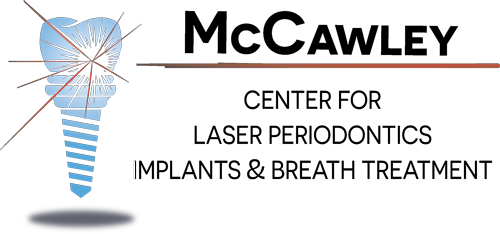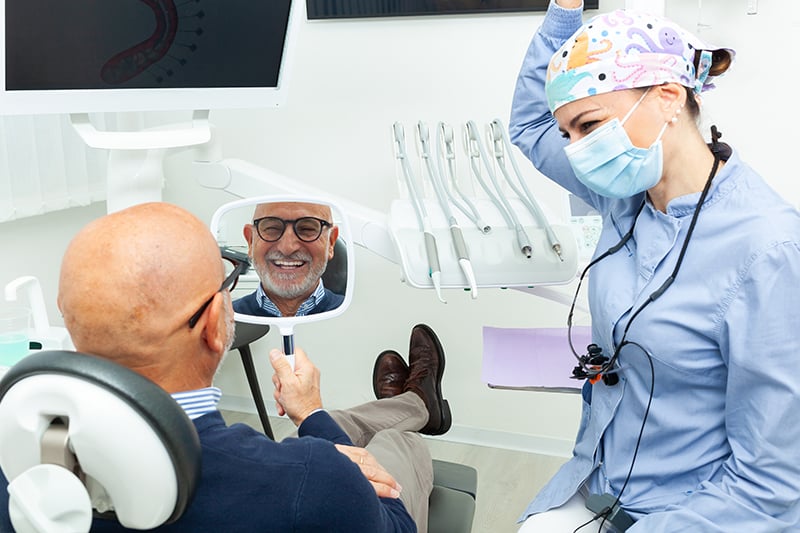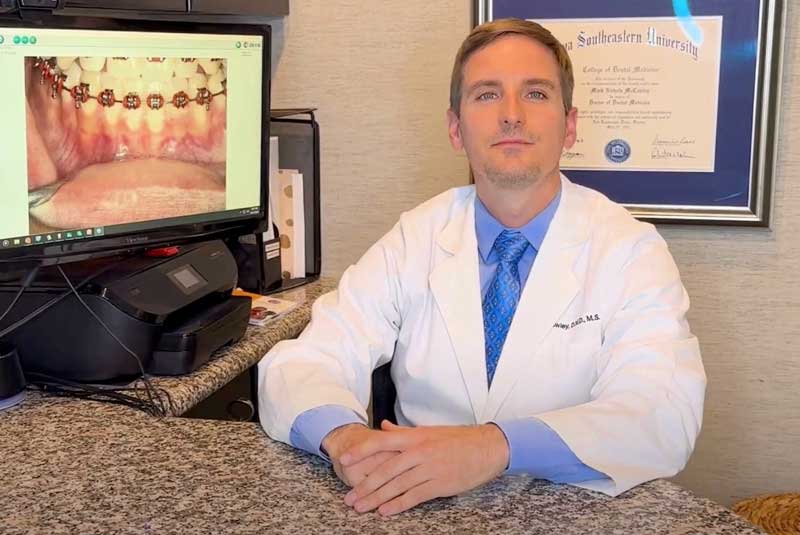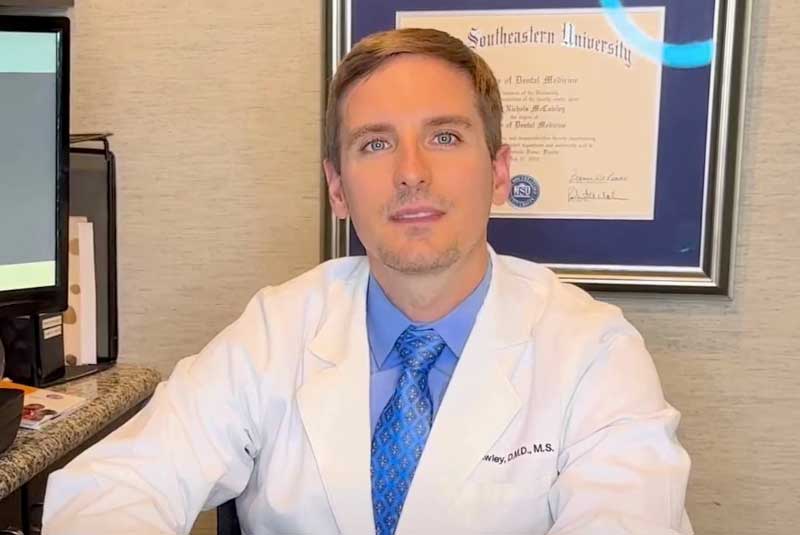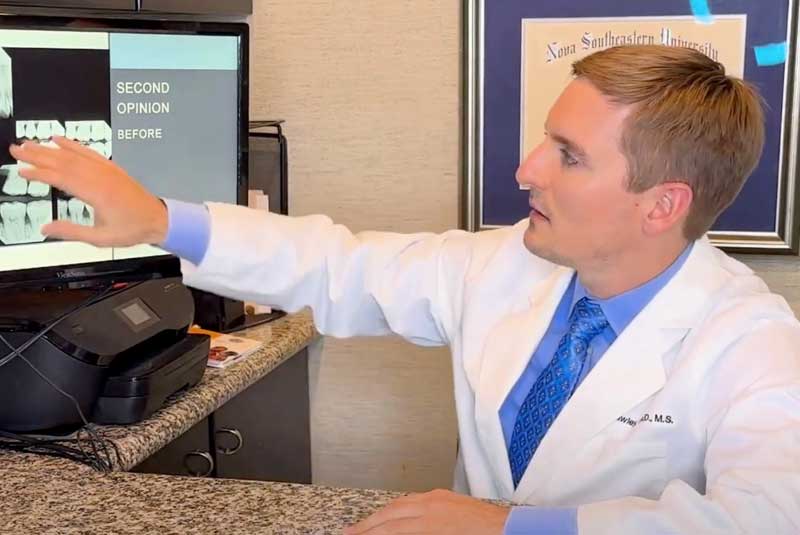| ✅ Reviewed by Dr. Tom McCawley | 🕒 Reading time: four minutes |
If you have a dental implant and are beginning to notice symptoms such as swelling, bleeding, or a persistent odor around the implant site, it may be more than irritation.
These signs could indicate peri-implantitis, a progressive infection that affects the gum tissue and bone supporting your dental implant.
One of the most effective treatments for peri implantitis is LAPIP®, a laser-based therapy designed to eliminate infection and promote bone regeneration without the need for traditional surgery.
What Is Peri-Implantitis?
Peri-implantitis is an infection that occurs around a dental implant. It is similar to periodontitis (gum disease), but it involves the tissues and bone that surround a titanium implant rather than a natural tooth.
This condition is caused by bacteria that accumulate in the gum pocket, triggering inflammation and the gradual destruction of the surrounding bone.
While many patients expect implants to be permanent and maintenance-free, implants require professional monitoring and routine care to remain healthy. Peri-implantitis can develop months or even years after the implant is placed.
| 😟Worried About Complications with Dental Implants? If you are hesitant to move forward with a dental implant because of concerns about complications like peri-implantitis, it is important to choose a provider who has the experience and training to protect your long-term health. At McCawley Center for Laser Periodontics & Implants, we use advanced diagnostics, trusted materials, and proven techniques to support successful outcomes and provide the kind of follow-up care that helps prevent problems before they start. |
Common Symptoms of Peri-Implantitis
This condition may begin with mild or unnoticeable symptoms, which is why it is often overlooked in its early stages. Over time, however, patients may begin to experience the following:
- Bleeding around the implant during brushing or flossing
- Swelling or tenderness in the gums
- A persistent foul odor or unpleasant taste
- A visible ball-like swelling, pimple, or pocket near the implant
- Loosening of the implant crown or subtle shifting and discomfort when biting
- General fatigue or a run-down feeling without clear cause
These symptoms may fluctuate or seem to improve temporarily with antibiotics or over-the-counter products, but the underlying infection often remains active. Early intervention is critical to preserving the implant and surrounding structures.
| ⚠️If something does not feel right, trust your instinct.Even subtle changes around a dental implant can indicate a deeper issue. If you suspect something is wrong, it is always better to have it evaluated promptly. Early action gives you the best chance to protect your implant and avoid more serious complications |
How Quickly Does Peri-Implantitis Progress?
The rate of progression varies from one patient to another. In some cases, bone loss may occur slowly over time. In others, particularly when systemic risk factors such as diabetes, immune suppression, or smoking are present, bone loss may advance rapidly.
Once the bone surrounding the implant begins to deteriorate, the implant becomes less stable and more difficult to save.
Can an Infected Implant Be Saved?
In many cases, yes it can be saved. We specialize in treating peri-implantitis with a minimally invasive approach called LAPIP (Laser Assisted Peri-Implantitis Procedure). This procedure uses a laser to remove infected tissue, sterilize the area, and stimulate bone growth around the implant.
Unlike traditional surgical options that require cutting or sutures, the LAPIP® protocol targets only the infected tissue around the implant, leaving healthy tissue intact and stimulating new bone growth to reinforce the stability of your implant.
The LAPIP Protocol: A Proven Solution
LAPIP is currently the only FDA-cleared protocol that promotes true regeneration of bone around an infected dental implant.
If we determine that your implant is infected but still stable, we may recommend LAPIP as the most effective way to treat the condition and preserve your implant.
The procedure is designed to eliminate bacteria, detoxify the implant surface, and stimulate bone regrowth, all without traditional surgery.
Here is what the LAPIP protocol includes:
- Diagnosis: We begin with a detailed evaluation, using high-powered microscopy to identify the bacteria and pathologic proteins contributing to the infection. This allows us to diagnose the true source of the problem and determine whether laser treatment is appropriate.
- Laser surgery procedure: A thin laser fiber is gently inserted between the gum and implant. The laser vaporizes infected tissue and bacteria while sealing the wound with a stable fibrin blood clot. This creates a clean, closed environment that supports healing and helps reduce the risk of reinfection.
- Debridement: We use ultrasonic scaler tips to remove microbial debris from the implant surface. This step enhances tissue reattachment and encourages proper healing.
- Regeneration: The laser energy also stimulates the body’s natural healing response, activating bone and soft tissue regeneration around the implant. In many cases, we are able to reverse bone loss and stabilize the site. When bone loss is severe, bone graft can be added to enhance regeneration.
- Comfortable recovery: Most patients require only over-the-counter pain relief and are able to return to normal activities the following day. The procedure is minimally invasive, with no cutting or stitches required.
Our approach combines precision laser treatment with a deep understanding of the microbiological causes of implant infection. By focusing on the root cause we are often able to save implants that would otherwise be lost.
What Sets Us Apart
Our approach to implant infections is based on science, experience, and personalized care. We do not take a “wait and see” approach when a patient reports signs of infection.
Instead, we work quickly to assess the condition, identify the cause, and recommend a solution that preserves your implant whenever possible.
- Laser expertise: We were the first practice in the United States to adopt Nd:YAG laser technology, and we have performed thousands of LAPIP and LANAP procedures.
- Bacteria-focused diagnostics: We analyze bacteria using phase-contrast microscopy and lab testing to eliminate the infection at its root.
- Minimally invasive care: We treat infection without the discomfort, cutting, or gum recession associated with traditional surgery.
- A focus on preservation: Our goal is always to save the implant if the infection is treatable. Only in advanced cases where the implant cannot be saved will we consider removal and site grafting for future replacement.
Book a Consultation in Fort Lauderdale
If you have noticed swelling, odor, bleeding, or other changes around your dental implant, it is important not to ignore these signs. The earlier peri-implantitis is diagnosed, the better the chances of saving the implant and avoiding more extensive treatment.
Your implant was an investment in your health and smile. We are here to help you protect it. To book an appointment at our periodontal office in Fort Lauderdale, FL, call (954) 807-4829 or visit us at 800 East Broward Blvd #706 Fort Lauderdale, FL.
